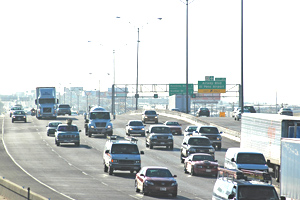States Scrambling Following Transport Funding Shutdown

Editor’s Note: President Obama signed a measure late Tuesday ending the budget impasse. Click here for an update.
ARLINGTON, Va. — State transportation officials said the sudden shutdown of the federal highway program is putting them at risk of abandoning projects and cutting safety programs unless Congress reaches a deal to extend the now-lapsed reauthorization.
“We have to have money to come in from the reimbursement so that we can pay our bills for the federal programs that we fund,” said Butch Brown, executive director of the Mississippi Department of Transportation.
Brown spoke here at a meeting Monday of the American Association of State Highway and Transportation Officials.
He said that the shutdown — largely the result of Sen. Jim Bunning’s one-man filibuster of a bill that would have extended the highway bill, as well as unemployment and health insurance benefits to out-of-work Americans — was costing states $157 million a day in highway funds and $157 million a week in transit funding.
Last week, Bunning began blocking the Senate from voting on the extension, forcing the Department of Transportation to furlough thousands of employees and suspend payments to states for highway projects. As of late Tuesday he continued to hold up the bill despite calls from Senate Republicans and Democrats to release his hold.
Brown said if Congress can get the program restored by Thursday, the damage to states may be mitigated.
“The battleship right now is still coasting – it hasn’t stopped yet,” he said. “If it stops completely it is going to take some time,” he said.
Without a deal between the House and Senate to temporarily reauthorize the highway and transit programs, Brown said states “cannot proceed doing business as usual — planning projects, implementing projects and financing projects without any certainty of federal funds.”
In addition to delayed construction projects, since highway safety programs run by the Federal Motor Carrier Safety Administration and other agencies are funded from the Highway Trust Fund, there will be cuts in enforcement events.
“As I understand what is going on right now is that payments for those services have been suspended,” Brown said. “Highway safety is now at risk. It’s been undermined. It’s been short circuited. You may still see patrolmen, you may still see safety inspections on trucks — but it’s not going to be the same as it was.”
FMSCA spokeswoman Candice Tolliver said that the agency “will retain its safety-critical staff who oversee roadside inspections, compliance reviews, new entrant safety audits and crash incident response. However, the impact of the furlough on the FMCSA’s operations cannot be underestimated.”
Because of the shutdown, Tolliver said FMCSA has “suspended important work on rulemakings that address distracted driving, electronic on-board recorders, hours of service and activities supporting its new safety measurement system, the Comprehensive Safety Analysis 2010. Other disrupted activities include the registration and licensing of new carriers and oversight of household goods moving companies.”
Brown said that the shutdown — largely the result of Sen. Jim Bunning’s one-man filibuster of a bill that would have extended the highway bill, as well as unemployment and health insurance benefits to out-of-work Americans – was costing states $157 million a day in highway funds and $157 million a week in transit funding.
Pete Rahn, director of the Missouri Department of Transportation, said last week the state cancelled $60 million projects and because of the shutdown had pulled back an additional $70 million in projects back.
“If Congress does not act, and act soon, the next step will not only be the suspension of new funding, but we will have to consider the suspension of ongoing contracts on which people are working on currently,” he said.
Susan Martinovich, director of Nevada Department of Transportation, said that the shutdown has closed down work on the Hoover Dam bypass, which she said would allow commercial vehicles to avoid a 90-mile detour to avoid the dam where they have been barred since the Sept. 11, 2001, terrorist attacks.
Stanley Gee, acting commissioner of the New York State Department of Transportation, said the state’s plans to replace the collapsed Champlain Bridge are on hold because furloughs at the Federal Highway Administration will prevent them from approving the plan.
Gee told reporters they had expected some sort of answer this week.
The House is expected to take up the Senate’s jobs bill — which includes an extension of the highway authorization — later this week, but Rep. Peter DeFazio (D-Ore.), chairman of the House Transportation and Infrastructure Committee's highways and transit subcomittee, said the “crystal ball is a little cloudy about how we go forward from here.”
DeFazio told the AASHTO gathering that there are some blocs within the House, notably the deficit-conscious Blue Dog Democrats and the Congressional Black Caucus, that may not support the bill.
“Congress is proving to be unusually dysfunctional this past week,” he said, noting that the Senate was “an absurd place,” because “one rather deranged, lame-duck senator” can hold up the highway bill extension.
By Sean McNally
Senior Reporter

